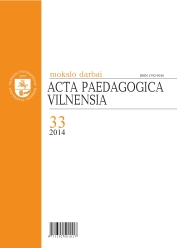Lietuvių kalbos ir literatūros ugdymo siekiniai ir jų įgyvendinimo retrospektyva
The outcomes of Lithuanian language and literature education and the retrospective of their implementation
Author(s): Zita NauckūnaitėSubject(s): Lithuanian Literature, Baltic Languages, School education, State/Government and Education, Present Times (2010 - today), Sociology of Education
Published by: Vilniaus Universiteto Leidykla
Keywords: educational policy; Lithuanian language and literature; education outcomes; mature examination; assessment criteria;
Summary/Abstract: The aim of the investigation is to establish the correspondence between the outcomes of Lithuanian language and literature education laid down by the educational policy for secondary schools, and the specific assessment criteria of Lithuanian language and literature matures examination. With this aim in view (on the one hand), educational documents on regulating the Lithuanian language and literature education in general secondary schools are analyzed (Lithuanian Language Education Strategy for 2010–2014, Lithuanian Language and Literature Framework Programme for Secondary Education) on the basis of which the Lithuanian language and literature education outcomes have been defined. On the other hand, the state matura examination syllabus and the construct of the Lithuanian language and literature exam are analysed for establishing whether the outcomes of education in the Lithuanian language and literature are adequately assessed by the language and literature state matures examination. The study shows that the main outcomes in the education of the subject under investigation – the Lietuvių kalbos ir literatūros valstybinio brandos egzamino užduoties vertinimo instrukcija. (2013). Internetinė prieiga: http://www.nec.lt/394/ [Žiūrėta: 2014 08 10]. Lietuvių kalbos ir literatūros vidurinio ugdymo bendroji programa. (2011). Internetinė prieiga: http://www.upc.smm.lt/suzinokime/bp/2011/ [Žiūrė- ta: 2014 08 10]. Lietuvių kalbos ugdymo bendrojo lavinimo programas vykdančiose mokyklose 2010–2014 metų strategija. (2010). Internetinė prieiga: http://www3.lrs.lt/ pls/inter3/dokpaieska.showdoc_l?p_id=390510&p_ query=&p_tr2= [Žiūrėta: 2014 08 10]. Mokinių pažangos ir pasiekimų vertinimo samprata. (2004). Internetinė prieiga: www.upc.smm.lt/ ekspertavimas/biblioteka/failai/samprata.pdf [Žiū- rėta: 2014 06 10]. Nauckūnaitė Z. (2011). Lietuvių kalbos ir literatūros samprata: vidurinio ugdymo kaitos diskursas. Acta Paedagogica Vilnensia, t. 27, p. 102–114. Salienė V. (2013). Kalba kaip socialinis kultū- rinis reiškinys pagrindinės ir vidurinės mokyklos gimtosios kalbos ugdymo sistemoje. Pedagogika, t. 109, p. 105–109. Valstybinių brandos egzaminų kriterinio vertinimo nuostatai. (2013). 1 priedas. Internetinė prieiga: http://www.nec.lt/106/ [Žiūrėta: 2014 08 10]. THE OUTCOMES OF LITHUANIAN LANGUAGE AND LITERATURE EDUCATION AND THE RETROSPECTIVE OF THEIR IMPLEMENTATION Zita Nauckūnaitė Summary development of cultural, social and civic, communicative and creativity competencies – are evaluated by the matures examination only in part because of the enormous number of requirements set out for the task (essay) and the lack of flexibility in assessment criteria. The Lithuanian language and literature outcomes in secondary education could be more successfully achieved if the following conditions were observed: 1) the definition of argumentative essay should be modified, allowing students to choose their own references to the contents of Lithuanian literature and cultural phenomena; 2) themes of the literary essay should not require the evaluation of works of various authors or reviews of the development of literature, but the awareness of the specificity of an individual author and the ability to perform an in-depth literary analysis; 3) criterion-referenced assessment should be liberated from the precise calculation of errors and be based on a holistic approach.
Journal: Acta Paedagogica Vilnensia
- Issue Year: 2014
- Issue No: 33
- Page Range: 17-32
- Page Count: 16
- Language: Lithuanian

